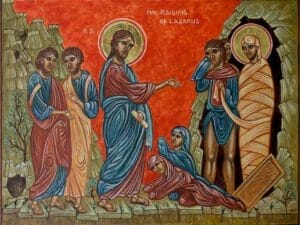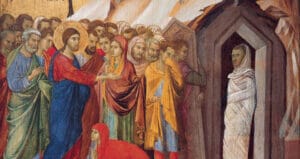A Reflection on the Gospel for Lent 5 Passion Sunday
Reflection from Fr Paul for Lent 5 2020 Passion Sunday Gospel.
Collect
Most merciful God, who by the death and resurrection of your Son Jesus Christ delivered and saved the world: grant that by faith in him who suffered on the cross we may triumph in the power of his victory; through Jesus Christ your Son our Lord, who is alive and reigns with you, in the unity of the Holy Spirit, one God, now and for ever. Amen

John 11:1-45 New International Version (NIV) The Death of Lazarus
Now a man named Lazarus was sick. He was from Bethany, the village of Mary and her sister Martha. 2 (This Mary, whose brother Lazarus now lay sick, was the same one who poured perfume on the Lord and wiped his feet with her hair.) 3 So the sisters sent word to Jesus, “Lord, the one you love is sick.” 4 When he heard this, Jesus said, “This sickness will not end in death. No, it is for God’s glory so that God’s Son may be glorified through it.” 5 Now Jesus loved Martha and her sister and Lazarus. 6 So when he heard that Lazarus was sick, he stayed where he was two more days, 7 and then he said to his disciples, “Let us go back to Judea.” 8 “But Rabbi,” they said, “a short while ago the Jews there tried to stone you, and yet you are going back?” 9 Jesus answered, “Are there not twelve hours of daylight? Anyone who walks in the daytime will not stumble, for they see by this world’s light. 10 It is when a person walks at night that they stumble, for they have no light.” 11 After he had said this, he went on to tell them, “Our friend Lazarus has fallen asleep; but I am going there to wake him up.” 12 His disciples replied, “Lord, if he sleeps, he will get better.” 13 Jesus had been speaking of his death, but his disciples thought he meant natural sleep. 14 So then he told them plainly, “Lazarus is dead, 15 and for your sake I am glad I was not there, so that you may believe. But let us go to him.” 16 Then Thomas (also known as Didymus[a]) said to the rest of the disciples, “Let us also go, that we may die with him.” 17 On his arrival, Jesus found that Lazarus had already been in the tomb for four days. 18 Now Bethany was less than two miles[b] from Jerusalem, 19 and many Jews had come to Martha and Mary to comfort them in the loss of their brother. 20 When Martha heard that Jesus was coming, she went out to meet him, but Mary stayed at home. 21 “Lord,” Martha said to Jesus, “if you had been here, my brother would not have died. 22 But I know that even now God will give you whatever you ask.” 23 Jesus said to her, “Your brother will rise again.” 24 Martha answered, “I know he will rise again in the resurrection at the last day.” 25 Jesus said to her, “I am the resurrection and the life. The one who believes in me will live, even though they die; 26 and whoever lives by believing in me will never die. Do you believe this?” 27 “Yes, Lord,” she replied, “I believe that you are the Messiah, the Son of God, who is to come into the world.” 28 After she had said this, she went back and called her sister Mary aside. “The Teacher is here,” she said, “and is asking for you.” 29 When Mary heard this, she got up quickly and went to him. 30 Now Jesus had not yet entered the village, but was still at the place where Martha had met him. 31 When the Jews who had been with Mary in the house, comforting her, noticed how quickly she got up and went out, they followed her, supposing she was going to the tomb to mourn there. 32 When Mary reached the place where Jesus was and saw him, she fell at his feet and said, “Lord, if you had been here, my brother would not have died.” 33 When Jesus saw her weeping, and the Jews who had come along with her also weeping, he was deeply moved in spirit and troubled. 34 “Where have you laid him?” he asked. “Come and see, Lord,” they replied. 35 Jesus wept. 36 Then the Jews said, “See how he loved him!” 37 But some of them said, “Could not he who opened the eyes of the blind man have kept this man from dying?” 38 Jesus, once more deeply moved, came to the tomb. It was a cave with a stone laid across the entrance. 39 “Take away the stone,” he said. “But, Lord,” said Martha, the sister of the dead man, “by this time there is a bad odor, for he has been there four days.” 40 Then Jesus said, “Did I not tell you that if you believe, you will see the glory of God?” 41 So they took away the stone. Then Jesus looked up and said, “Father, I thank you that you have heard me. 42 I knew that you always hear me, but I said this for the benefit of the people standing here, that they may believe that you sent me.” 43 When he had said this, Jesus called in a loud voice, “Lazarus, come out!” 44 The dead man came out, his hands and feet wrapped with strips of linen, and a cloth around his face. Jesus said to them, “Take off the grave clothes and let him go.” 45 Therefore many of the Jews who had come to visit Mary, and had seen what Jesus did, believed in him.

A Reflection for today.
The Gospel set for this Fifth Sunday of Lent leaves me with a smile on my face, because when I was a young curate way back in Chaddesden, Derby in the 1980’s, I preached on this very text at Evensong one night. Every Sunday two severely mentally handicapped ladies who had been in long term institutional care were now sharing a house with full-time support workers in our parish just near the Church of St Philip. They soon joined our congregation and loved to come to Church. In my sermon, I told the folks that I am sure Jesus did not ask Lazarus to come out of the tomb by simply whispering the words “Lazarus, come out” – but that he must have shouted the words, so I did shout them that night from the pulpit, and the one of the ladies got such a shock that she wet herself with fright, and the wardens had to clear up the mess. It was such an embarrassing moment for us all. I have never ever done this since, I can tell you.
Yet this story is full of various images for me, and Maggie and I once had a greetings card sent to us that showed Jesus shouting to Lazarus – “come out” and the figure of Lazarus appears at the entrance of the tomb, having been dead for four days replies – “I can’t, I look such a mess”. Some of us feel a little like that just now with our self-isolation.
But let’s be serious, and let me tell you about a little known play written by a named Eugene O’Neill. The play was entitled “Lazarus Laughed.” It was written way back in 1925. Its sub-title was A Play for Imaginative Theatre. It is a long theo-philosophical meditation with more than a hundred actors making up a masked chorus. In theatrical format, Lazarus Laughed appears to be a Greek tragedy. But the underlying message is very much akin to the cycle of mystery plays from the Middle Ages. I’m told that it was never a commercial success. In fact, it closed just a week after it opened on Broadway. However, I believe O’Neill managed to put his finger on the functional significance on what we consider today in our Gospel.
The play begins, or picks up, where the Biblical story leaves off. Lazarus had been buried for four whole days when Jesus came to the village of Bethany, but he had the stone rolled back from the tomb, and gave him back the gift of life. As the curtain goes up, Lazarus is seen stumbling out of the dark, blinking into the sunlight. And after the grave clothes are taken off of him he begins to laugh a gentle, soft laugh; nothing bitter, nothing derisive, an embracing, astonishing, welcoming sound. The very first thing he does is to embrace Jesus with gratitude. Then he begins to embrace his sisters and the other people who were gathered there.
He has a very clear look in his eye, nothing far away. It’s as if he’s seeing the world about him for the very first time. He reaches over and pats the earth very affectionately. He looks up at the sky, at the trees, at the neighbours as if he had never seen them before, as if he is overwhelmed by the incredible way everything is all ok. The very first words he utters are the words, “Yes, yes, yes,” as if to embrace reality as it is being discovered all over again.
In the play he makes his way back to his house and the whole village of Bethany is awash with wonder. Finally, somebody gets the courage to ask what was on everybody’s mind. “Lazarus, tell us what it’s like to die. What lies on the other side of this boundary that none of us have crossed?”
At that point, Lazarus begins to laugh even more intensely and then he says, “There is no death, really. There is only life. There is only God. There is only incredible joy.” He continues, “Death is not the way it appears from this side. Death is not an abyss into which we go into chaos. It is, rather, a portal through which we move into everlasting growth and everlasting life.” He then says, “The One that meets us there is the same generosity that gave us our lives in the beginning, the One who gave us our birth. Not because we deserved it but because that generous One wanted us to be and therefore there is nothing to fear in the next realm.
Our urgent Passiontide agenda more than ever right now at this time of lockdown and Covid-19 is to learn to accept, to learn to trust. We are put here to learn to love more fully. There is only life. There is no death.”
Well, Lazarus, in the play, goes back to his daily tasks and yet there is something different. He is now a non-anxious person. He is no longer vulnerable to that fear that diminishes the vitality of life. The house where he lives became known as the “House of Laughter,” and night after night, you would hear singing and dancing. And the spirit of this one who had come back with this message that there is nothing to fear began to spread throughout the whole little village. The quality of work began to rise all over Bethany. People began to live more humanely and more generously with each other. There did not seem to be the old occasion for conflicts that there had used to be. In fact, a joy settled over this whole little community because someone had come back saying that there was finally nothing to fear.
When Jesus emerged on Easter Sunday, His first words were, “Be not afraid.” He, too, would say, “There is only life. There is only laughter. There is only the joy and the mercy of God.”
I have come to believe that fear comes in three basic forms: the fear of falling or failing, the fear of loud noises or catastrophe, and the fear of abandonment. But if you’ll look to the bottom of all three of those fears there is the fear of death. This is the primal terror that what awaits us at the end of our journey. Homer, the ancient poet, put it quite succinctly. He said, “Death is that thing that destroys what we call life and who can remove the terror of it?” I hope your answer will be the same words that Lazarus uttered as he came out of the tomb, “Yes, yes, yes.” Because if we want more of life, it is actually the Father’s good pleasure to give it to us. “Laugh as much as you breathe and love as long as you live.
Fr Paul
